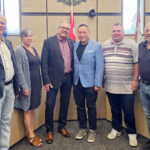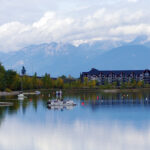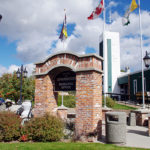Home »

DOI sending Speculation Tax motion to UBCM
By Anne Jardine
District of Invermere (DOI) council has agreed to have a notice of motion sent to the Union of British Columbia Municipalities (UBCM) regarding support in halting any expansion of the recently hatched provincial government Speculation Tax.
The (non-resident ownership empty house) Speculation Tax will be implemented in Vancouver and the larger Lower Mainland municipalities, as well as Victoria, Nanaimo, the Sunshine Coast, and Kelowna. Its intent is to limit the number of vacant residences and slow down what is perceived to be too much foreign ownership and rampant real estate speculation.

“If you file income tax in B.C., you’re exempt from the tax,” said DOI Mayor Gerry Taft.
Although the new tax is not set for the other municipalities of B.C., the mayor and district councillors expressed concern that the trend would rapidly spread across the whole province, as foreign owners would move east into the Interior to avoid the tax. Council was also concerned about Albertan and other Canadian non-residents who regularly purchase vacation, recreational, and eventual retirement properties.
“In the Lower Mainland, this tax makes a lot of sense, but the situation is very different here. Here nearly all the non-resident owners are Canadians. To me that seems unfair,” said Coun. Justin Atterbury.
“Yes, I agree there’s a difference between foreign money parking in B.C. real estate and Canadians from other provinces purchasing second, recreational homes, but the tax is not supposed to apply to recreational property,” the mayor responded.
Coun. Al Miller commented: “We probably shouldn’t be getting too upset about this until we see what the actual legislation and regulations look like.”
“True, the details have not been finalized,” Mayor Taft responded. “We still may be able to affect the final policy through the UBCM (resolution process). I’d like to see us draft up a couple of statements to go as late resolutions – the actual deadline for resolutions is already passing by, but maybe we can come up with something for late resolutions.”
“It’s worth considering,” said Coun. Attenbury.
“What bugs me most,” said Mayor Taft, “is that the proceeds from this tax – which will over the next few years ramp up to two per cent of the property’s assessed value – and the total is predicted to be a couple hundred million annually, will be going to general revenue, and not back to the communities.
“I’m not so concerned about general revenue as that Victoria could potentially bring in a tax like this to our part of the province without consulting. I’d like to see a provision for opt-in or opt-out. I’d like to see a resolution that allows the community to have a say on what is being imposed on them.”
Council agreed to draft a resolution to UBCM about “community say,” and requested staff to come up with a wording.
In response to a question from the gallery, Coun. Miller explained that the concerns about introducing such a tax “arise from a fear that a speculation or non-resident tax may deter potential investors who might want to come into the Kootenays.”
Mayor Taft Feb. 28 deferred further discussion of this matter until absent councillors could have a chance to respond, and he adjourned the meeting.
In accordance with council’s direction, DOI Corporate Officer Kindry Luyendyk on Monday, March 5, forwarded this resolution, which will be sent from the District of Invermere to the UBCM meeting in April as a late resolution:
WHEREAS the Province has indicated a plan to implement a new land tax on vacant and recreational properties in the Lower Mainland and Kelowna areas;
AND WHEREAS the Province has indicated that it will not initially apply to the Kootenays and other portions of the Province;
BE IT RESOLVED THAT the speculation tax not be expanded to other areas of the province without meaningful consultation and the opportunity for local governments to choose to opt in or out of the program;
FURTHER BE IT RESOLVED THAT the Province consider refining the speculator tax so that it does not penalize Canadian’s with a recreational property, no matter what Province they reside in or file income taxes in.”
e-KNOW







